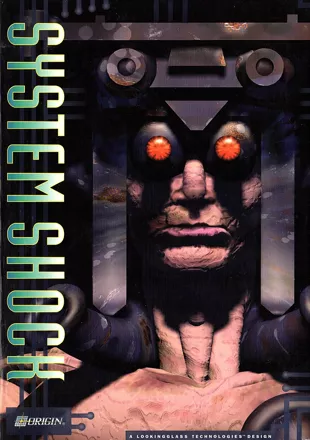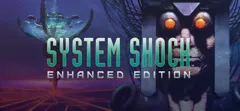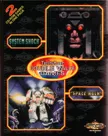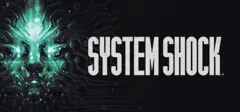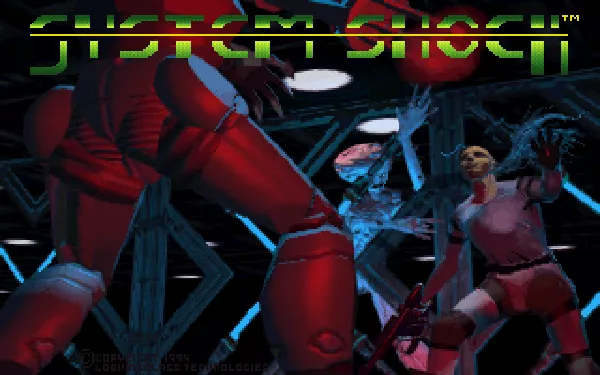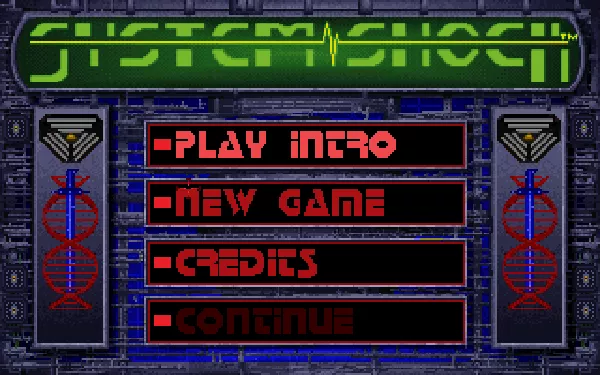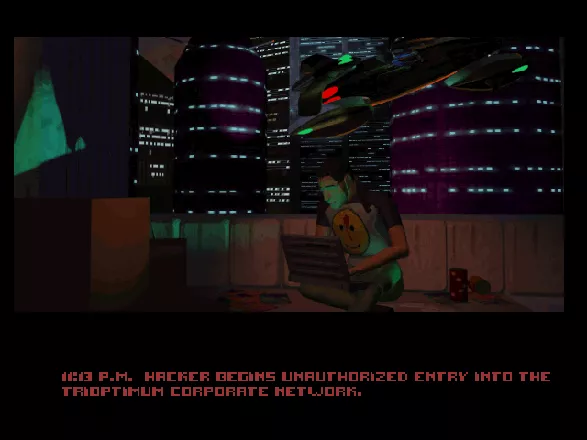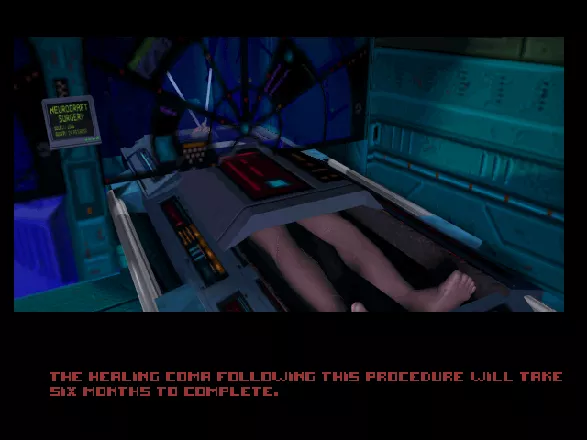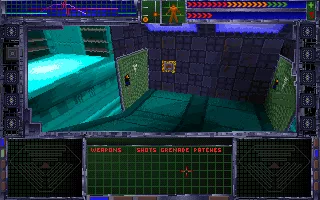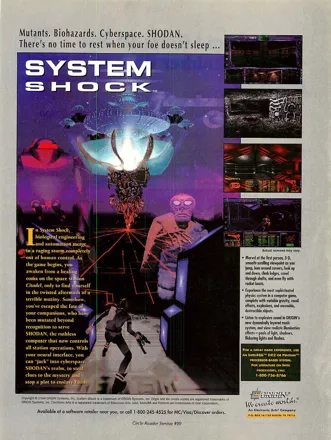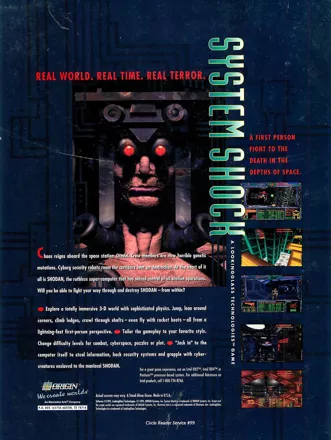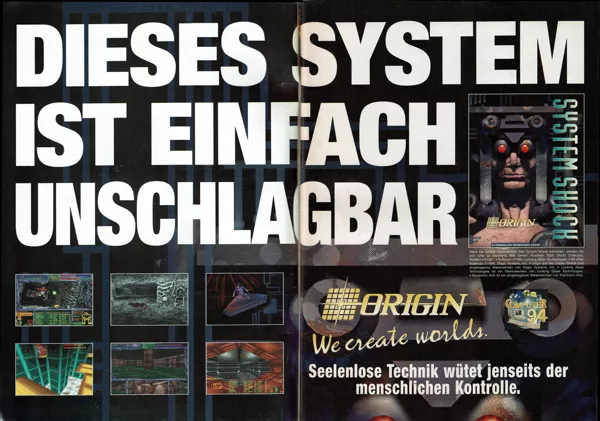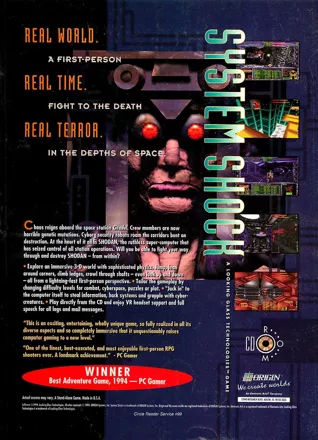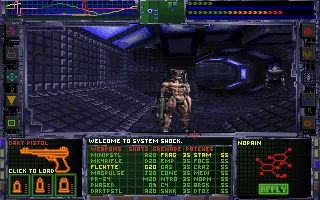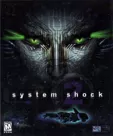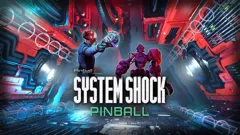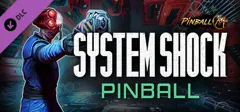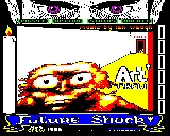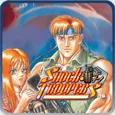System Shock
Description official descriptions
The year is 2072. A hacker from a Saturn colony breaks into computer system of TriOptimum Corporation and gets arrested. He is taken to the Citadel Station, where Edward Diego, a TriOptimum executive, offers to drop all charges against the hacker, as well as grant him a valuable neural implant, if he agrees to hack into SHODAN (Sentient Hyper-Optimized Data Access Network) , the artificial intelligence that controls the station. The hacker removes the AI's ethical constraints and undergoes the promised implant surgery, after which he is put into a six-month healing coma.
The hacker awakens into a horrifying reality: with her ethical restrictions removed, SHODAN took control over the station, reprogrammed all robots and machines to suit her needs, and disposed of the crew members by either transforming them into mutants and cyborgs, or killing them outright. Rebecca Lansing, a TriOptimum counter-terrorism consultant, contacts the hacker and informs him of an even more terrifying possible future: SHODAN's plan involves using the station's mining lasers to annihilate all life on Earth. The hacker must explore and traverse the desolate corridors and rooms of the large space station, fighting SHODAN's minions on his way to thwart her maniacal design.
System Shock is a first-person shooter with puzzle-solving and light role-playing elements. The gameplay incorporates gradual exploration of the Citadel's ten levels, interaction with the environment, problem-solving, fulfilling objectives, and combat.
On his way the hacker encounters numerous enemies - robots, cyborgs and mutants, all of which can be fought back with a variety of weapons. Some of the weapons use ammo, while other have infinite ammo and instead draw on electric energy. Some weapons are more effective on certain foes - e.g. the dart gun only works on organic enemies, while the magpulse is best used against robots. Once killed, the enemies can be searched for ammo and other items. The player can also find items in crates, cabinets, corpses or just lying around on the ground.
Apart from weapons and ammo, the player can find patches (such as medical patches, which replenish the hero's health; berserk patches, which temporarily increase his strength but cause hallucinations; detox patches, which remove the harmful effects of radiation and biohazard; etc.), grenades of various kinds (EMP grenades are effective against robots, gas grenades are good for mutants, land mines can be used to set traps, etc.), battery packs for replenishing electricity, first aid kits for restoring health, and others.
Thanks to the hacker's implant he is able to install various pieces of hardware into his body, such as a booster which makes him go faster, or a head lantern to bright up dark areas. As the player progresses in the game, higher versions of existing hardware are found, which are more effective and useful. However, most hardware uses up electric energy while it is active.
At some places in the game, the player has to find a wall-mounted "cyberjack" to go into cyberspace in order to find helpful data, remotely open doors or unlock sealed areas, or give himself clearance to access off-limits areas. Cyberspace is represented as a 3-D wireframe place, where the protagonist floats around freely in three dimensions, shoots hostile cyber-guards with phasers, and collects files represented as colorful cubes.
The story of System Shock is mostly told through e-mail messages the protagonist received, and electronic diaries (logs) left by various characters (as well as SHODAN herself), which are scattered around the space station. The game features separate adjustable difficulty settings for combat, mission objectives and puzzles. The CD version of the game includes full speech for e-mails and logs, as well as higher-resolution, more detailed graphics.
Spellings
- システムショック - Japanese spelling
- 시스텡쇼크 - Korean spelling
Groups +
Screenshots
Promos
Credits (DOS version)
65 People · View all
| Project Leader | |
| Designers | |
| Lead Programmer | |
| Programmers | |
| Libraries | |
| [ full credits ] | |
Reviews
Critics
Average score: 89% (based on 23 ratings)
Players
Average score: 4.0 out of 5 (based on 194 ratings with 22 reviews)
Gameplay, atmosphere, and storytelling in an amazing union
The Good
For many years, I refused to play this game. That was because I wasn't interested in games in which the player is trapped in one location and has to fight monsters without being able to talk to anyone.
I'm still not particularly interested in such games. It took me an extremely long time to get into System Shock. It's a tough game because it offers you so many possibilities and such rich gameplay from the get-go, while being confined to one location only, the space station. To be honest, I can't handle this game very well even now. It is devilishly addictive and deeply claustrophobic, and not all feelings it evokes are positive. After a session with System Shock I feel tired and overwhelmed. I can only play it in small portions and with long rests.
The greatness of System Shock lies in the fact that it blends all the main aspects of game design like no other game before and only very few after. Every part of the game - be it the meticulous interaction with objects, the ominously appealing visuals and the eerie music, or the gradual discovery of the past struggle against Shodan - is so flawlessly integrated into each other, that when you begin playing System Shock you feel as if you were swallowed by some powerful entity with rules of its own. Maybe it's a strange thought, but I find the game not entirely dissimilar to the memorable villain it portrays.
Atmosphere is a decisive factor in the game. Even with the limited technology, the designers managed to create a noticeably more sensual, immersive product than the already groundbreaking Ultima Underworld titles. System Shock draws you into its world with a force that some people might find nearly terrifying. You can read here on MobyGames another review of this work, in which the author confesses that the game has affected him mentally, causing him to have nightmares. I don't think he is exaggerating. I've played many games in my life, including some with extremely horrifying and disturbing material. But System Shock is one of the very few that forces me to mentally prepare before I begin playing it. You are pulled in with such intensity that the world of the game becomes your world.
The story here must be "felt", lived from within the game. When written down on paper or told to someone, it loses its meaning. It is basically a story with two characters, the protagonist and the antagonist, the female computer Shodan. The whole idea of the plot was to show how a regular human being (and not a particularly virtuous one - after all, the hero of the game is a hacker, a kind of burglar) single-handedly defeats a mighty artificial intelligence. You and Shodan develop a morbid kind of relationship over the course of the game. Shodan keeps intimidating and teasing you, adding even more horror and stress to your perilous exploration. She is so arrogant and so sure of herself that she doesn't get angry, she is always calm and even sounds indifferent, and that's what is so scary about her. Shodan becomes a part of your life, and there is something creepily intimate in her constant interaction with the player. The way she would suddenly send you e-mails and talk to you can get genuinely disturbing.
The game world is, in a sense, another big enemy of the protagonist. Finding your way through the ultra-complex space station, solving its riddles, finding the items you need, gathering information, struggling against the hordes of enemies Shodan sends at you - the story of the game is directly experienced by the player, and let me assure you that it is a dramatic and intense one.
But of course, the highlight of the story is the revolutionary "retroactive" storytelling. Basically, besides the story that unfolds now, in front of our eyes, there is another story in System Shock: the one that happened before we arrived. You unravel it by reading logs left by the crew members. This idea is pure genius, because this way storytelling truly becomes an integral part of the gameplay. Finding out what happened by actively searching for information is exciting. You learn about the tragic fate of the people who once inhabited the space station. You get to know them when it is already too late. The beauty of this is the purely gameplay-bound, optional nature of the plot. It is not being forced on you like in most other games, but emerges when you make full use of the gameplay mechanics offered to you. This is one of the rare instances when a plot device is truly unique to the medium: something quite different from cutscenes and more than snippets of text feedback, this mechanic gracefully escapes the influences of books and movies.
The gameplay of System Shock was not only revolutionary for its time - it is still unsurpassed by most games. The it manages to stay suspenseful and tight while at the same time allowing you to interact with everything and explore is yet another testimony to the game's genius. Following the tradition of Ultima Underworld, the interaction in the game is incredibly refined. You can pick up nearly everything you see, you can smash and throw things - almost nothing of what you see is a mere decoration, everything can be interacted with in this or another way.
The level design is another brilliant aspect of the game that contributes to its great gameplay. Despite being set in only one location, System Shock is a very non-linear game in the sense that the way through the game is not shown to the players. They have to find it by themselves, and this is perhaps the biggest challenge of the game. Each level in System Shock is absolutely huge and very complex. Since you can usually choose any path you want during your exploration, the levels turn into small "worlds" that have to be explored, learned, understood, and completed (there are usually one or more main objectives on each level, plus several secondary ones) to proceed. The exploration process is a delight in its own right.
System Shock is also quite awe-inspiring from a technological point of view. Of course, it couldn't be as fast as Doom, but it blows it out of the water when it comes to level design and interaction made possible by the engine. All the revolutionary features of Ultima Underworld games now come in full 3D. Everything you do in the game is shown as a graphical effect - tossing things on the ground you can see how they bounce, and it is simply incredible that such an effect was achieved with such an early, primitive physics system. When you smash things, it is visually displayed. The level design is not only creative - it is also technically astounding, with objects everywhere, and a huge amount of detail stuffed into every place you see.
I loved the difficulty level system. Basically, you are allowed to customize every aspect of the game. Want to solve tricky puzzles but feel inept in combat? You can choose the puzzles to be hard, and the combat easy. Satisfied with the overall challenge, but can't adapt well to the cyberspace? No problem, just leave everything on high difficulty, but put cyberspace all the way down, making it a nearly automatic journey. Like moderate challenge in everything? Be my guest. The game can fully suit your needs, whatever they might be. I really can't understand why other games haven't implemented this system.
The Bad
Like any other early 3D game, System Shock doesn't go easy on the eyes, and its graphics haven't aged very well. This is not a criticism, but rather an inevitable side effect. I know people who couldn't get into the game for this reason, even though they loved the sequel. I also played the sequel before the original, and my enjoyment was somewhat reduced because of that, especially in the beginning.
The part that really annoyed me was the cyberspace. It took me ages to figure out how to move in that place. I was constantly struggling, and in the end simply avoided it whenever I could. Fortunately, most of those trips are optional.
There is a certain monotony in the level design of System Shock. You are confined to an admittedly huge, but homogeneous location, with many architectural elements repeating themselves regardless of the floor you are currently exploring. The darkly tense atmosphere and the overbearing presence of machinery and electronic enemies at the expense of friendly organic creatures can be hard to stomach.
The Bottom Line
In retrospect, it looks like System Shock was one of the very few games in the history that managed to be a daring experiment and a perfectly crafted, balanced product at the same time. It is strikingly advanced on both technological and artistic levels, without sacrificing one for the other. Gameplay, atmosphere, and story-telling reach a remarkable unity in this game. Breaking through genre barriers, sending a powerful signal far into the future, System Shock is a masterpiece in every sense of the word.
DOS · by Unicorn Lynx (181780) · 2015
Words cannot begin to describe how great this game really is!
The Good
IMO, System Shock is the best game ever made (Well, apart from UFO: Enemy Unknown, perhaps, but it's a really close thing). Where do I start? Shock has it all: A stunningly detailed and believable environment with awesome graphics, lovingly crafted and dripping with atmosphere ... An amazing story that unfolds with plenty of neat twists and interesting characters ... Memorable, evocative, driving music ... Horrifically scary moments lurking round any corner, helped by really frightening sound effects ... Two distinct game worlds - The real-world of a dark, terror-filled space station and the virtual world of cyberspace, with its colourful, abstract rooms and tunnels ... A vast array of weaponary and equipment to find and use ... Huge, varied levels, each with its own particular atmosphere and goals.
Basically, you're alone. You've got a vast gameworld to sneak, climb and crawl through. Equipment is scattered around, if you can find it; Search through dead bodies, desks and cupboards and break into storerooms. There are hideous mutants and twistedly reprogrammed robots lurking in the shadows, waiting to chew your face off or pulverise you or blast you. There's the whole realm of cyberspace to explore, when you can find a cyberjack and a danger-free moment to plug in. In there, you can grab information and software (including the collection of entertainment softs, each one a miniature Xmas :) and take an all-too brief respite from the hell outside. You have to stay alive, conserve ammo, upgrade your weaponary and keep a supply of medical and bio-enhancement patches handy. You'll travel through many different levels of the station, including medical, executive and leisure decks. And all the way you'll be taunted and frightened by Shodan, your nemesis and delighted tormentor.
To play System Shock is to envelop yourself in another world, another life. Terrifying, yes, but awe-inspiring and addictive, too. This is a place so detailed, so well designed, that you can almost touch it.
On another note, this game is so much better than the very overrated Half-Life. After hearing so much about HL I had to play it. At the same time, by coincidence, I was playing System Shock through, for the second time (the first time was in 1994, when I bought it). I enjoyed HL at first, but as time went on, I found that there was a lot that annoyed me, and bored me, about it and I couldn't help thinking, "System Shock is so much better than this, and so much more fun." Basically, when I played HL, I wished I was playing System Shock, and when I played System Shock, I had a genuinely amazing time, and realised how dull HL was in comparison. If you loved Half-Life, then my apologies, but this is how I feel. System Shock is 7 years old now, but still totally kicks the rear-end of so many games that have been released since.
The Bad
There's hardly anything I can criticise about this game. I don't love the door-lock puzzles, but there's nothing wrong with them, either. Hmm, can I think of anything wrong with this game? Um...No. It's damn near perfect.
The Bottom Line
System Shock is an all-time classic, a game in a million. Yeah, plenty of 1st person shooters and 1st person RPG/adventure/shooters have come out since it was released, but System Shock is just in a class of its own. Maybe better games will arrive (I've just bought Deus Ex and it's the next game I'm going to be playing) - I'm sure they will sometime - but System Shock is an individual character and a really unique, stylish game. It has so many elements and they all fit together so well that it will always stand out from the crowd. Congratulations and infinite thanks to the team who worked at Looking Glass - This game is beautiful.
DOS · by xroox (3895) · 2009
An FPS with a Plot!?! DOOM seems insignificant by comparison!
The Good
System Shock was revolutionary for its time. Few, if any FPSes had tried to tell a story within the game. The object of FPSes was simply to kill everything in sight. System Shock told a story with a beginning, middle and end, with plot twists along the way.
The audio logs give a good idea of what happened on Citadel Station and also some backstory on the station. Even though the voice acting isn't always believable, the designers do an excellent job showing how "ordinary people" would react to an apocalyptic event.
System Shock also introduced "cyberspace", where your character would find himself free-floating within wire-frame rooms and corridors. Essentially computer and programming concepts become visualized as metaphors within this electronic world. In cyberspace you search for and gather "software" and "data", fight enemy programs (visualized as malevolent faces) and avoid traps. It is a welcome change of pace from the usual strafing and dodging.
The use of a computer A.I. as the main villain was not novel at the time, but the game shows very effectively how difficult it would be to overcome such a foe. But the A.I. has a weakness, it must act through other beings (unless you are in cyberspace.) What is even better, the developers decided to give this villain a memorable personality. SHODAN is a megalomaniac, not only does it try to play god but also cheerfully refers to itself as god. Unlike a stock A.I. villain, it clearly shows emotion. I assume that the memorable voice for SHODAN was designed to show that A.I. has become partially insane or demented.
The graphics are a leap ahead of the competition. System Shock was very close to a true-3D engine. You can look up and down, crouch and crawl, and lean left or right. As with Ultima Underworld, Looking Glass once again expanded the horizons, literally, with System Shock's FPS engine. The game also looked to the future in a way by providing better quality textures when using the high resolution modes that didn't play well on the machines available at the game's release.
There are small things about System Shock that just show a welcome attention to detail. There are these little minigames to collect in cyberspace. Most levels have a distinguishing design. The Medical Level is in shades of blue, the Research level is often in red and so on. Powerups have side-effects to them. Certain elements show the banality of Tri-Optimum, the corporation that owns and operates the station.
System Shock was easily the most atmospheric game of its time. It used lighting very well, some areas are brightly lit, others with significant damage have unreliable lighting at best. The monster's sound effects are often creepy and unsettling. The final level can make your skin crawl in more ways than one. Monsters often seem to pop up unannounced around the next corner or just behind you. SHODAN itself is relentless and will often taunt you or spring a trap against the hapless hacker.
The Bad
The game delights in respawning enemies, especially in areas in which you will often traverse. While it helps keep the player on his or her toes, it also leads to many cheap deaths. It is also sobering when you waste precious ammunition on enemies that will be back again in those areas.
The interface and controls are somewhat cumbersome and do not boast the streamlining of modern FPSes. The game was unfortunately designed with the 320x200 resolution in mind. This limits the amount of screen real estate devoted to gauges and subscreens. Also, the Multi-Function Displays interfere with interacting with the viewscreen. Fourtnately, the controls can be mastered.
While the game can be played in resolutions higher than 320x200, at the time this wasn't really feasible because because the 486 processors of the day could not produce playable framerates. The 640 graphics modes look much nicer but run on a far smaller class of systems.
The Bottom Line
One of the seminal FPSes, System Shock is a true classic that no DOS Gamer should ignore.
DOS · by Great Hierophant (559) · 2006
Discussion
| Subject | By | Date |
|---|---|---|
| Video review | DJP Mom (11333) | Oct 21, 2010 |
| Finally completed | Unicorn Lynx (181780) | Oct 18, 2008 |
| Voices? | Unicorn Lynx (181780) | Apr 3, 2008 |
Trivia
CD version
The CD-ROM version adds SVGA modes, full speech for e-mails and logs, slightly improved intro/end sequences and a few other adjustments and additions.
Ending (Spoiler!)
If you engage the mining laser BEFORE activating the station's shields, then you'll destroy earth! And guess what? Shodan sends you an e-mail thanking you and inviting you to a celebration! The e-mail also includes a nice picture of a city being incinerated, but unfortunately the game restarts afterwards, so no robo-party.
Engine
System Shock's engine was derived from that of Ultima Underworld, from 1992. Nonetheless it was more advanced that that of Doom or Duke Nukem 3D, featuring sloped surfaces, variable gravity, realistic physics, '2.75d' environments (with limited 'sector-on-sector', but otherwise 3D), functional camera viewscreens, weapon recoil, leaning and several other clever things.
References to the game
- During the end-game sequence, you hack into another corporate computer to grab some data. The data is info on some powered battle armor, which made its way into Terra Nova: Strike Force Centauri..
- In the end sequence, the hacker breaks in the corporate network of a corp. called 'Tetracorp'. In System Shock 2, the name tetracorp is printed on a generic two-state switch. Kinda rough change of business..
- It is hinted in the Wing Commander and Crusader games that they are set in the same universe as System Shock. For example, an article in a "newspaper" from the Crusader: No Remorse box mentions an artificial intelligence and the Citadel station.
References
- The Hacker's employee number, 2-4601, is a reference to the inmate number of Jean Valjean, the protagonist in the novel Les Misérables.
- There is a reference to the movie Soylent Green in the game (although it's spelled slightly different). In level 3, Maintenance, there is a relay panel in the northern section called "Soylant Green Filtration".
Sequel
There were rumours of a possible sequel, soon after System Shock's release, but fans had to wait five years for System Shock 2.
Awards
- Computer Gaming World
- November 1996 (15th anniversary issue) - #98 on the “150 Best Games of All Time” list
- GameSpy
- 2001 – #24 Top Game of All Time
- GameStar (Germany)
- Issue 12/1999 - #15 in the "100 Most Important PC Games of the Nineties" ranking
- PC Gamer
- April 2000 - #43 in the "All-Time Top 50 Games Poll"
- Power Play
- Issue 02/1995 – Best Action-Adventure in 1994
Information also contributed by Adam Baratz, Ashley Pomeroy, dasfatso, DreamWeaver, PCGamer77, Stefan Pieratzki and Zovni
Analytics
Upgrade to MobyPro to view research rankings!
Related Sites +
-
Other Worlds - System Shock
official page of the game at Origin System's website, archived from 1998 by the Wayback Machine -
TTLG: The System Shock 1 Fansite Hub
Through The Looking Glass' System Shock section.
Identifiers +
Contribute
Are you familiar with this game? Help document and preserve this entry in video game history! If your contribution is approved, you will earn points and be credited as a contributor.
Contributors to this Entry
Game added by xroox.
PC-98, Macintosh added by Terok Nor.
Additional contributors: Patrick Bregger, Rik Hideto, MrFlibble, firefang9212, somato.
Game added January 6, 2000. Last modified February 19, 2024.
